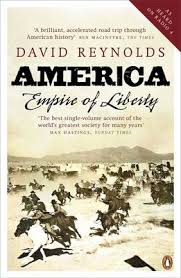
In the next academic year, I will be teaching a class that surveys American history from 1776 to the present. The course code here at Coventry University is ISS 270.
While the module will be organised along broadly chronological lines, emphasis will be placed on addressing those general themes that have been important in the shaping of modern North America. The major themes of this module are: political change and institutions; key leaders; war and diplomacy; economic and social development. The primary focus of the module is the history of the United States. However, consideration will also be given to the histories of the other nations of North America: Canada, Québec, and Mexico.
The overarching theme or narrative of this module is the rise of the United States from a small confederation of agrarian republics into a coherent nation-state capable of projecting military, economic, and cultural power into all corners of the globe. All of the lectures and most of the seminar readings will be connected to this theme in some way or the other.
Intended Module Learning Outcomes
The intended learning outcomes are that on completion of this module the student should be able to:
1. Identify the events and ideas which have shaped the political, economic, and cultural history of the United States.
2. Explain the processes by which the United States went from a small agrarian republic to a global superpower.
3. Assess the nature of the political system and the ideas and issues which dominated American politics between 1776 and 2000.
4. Understand the relations between the United States and its two neighbouring countries, Canada and Mexico.
5. Understand the complex and multicultural nature of the American population.
Module Organisation and List of Lectures and Seminars
Your responsibilities each week will include completing the following readings before the seminar. The seminars last just fifty minutes, but you can expect to spend up to 4 hours each week preparing for them. In a typical week, you will read the assigned pages in the textbook by David Reynolds and a primary source and you will listen to a podcast.
Please note that the page numbers refer to the paperback version of the textbook by Reynolds.
The podcasts have been taken from http://backstoryradio.org and http://www.gilderlehrman.org/historians/podcasts/index.php
In addition, you are expected to follow and read the Disunion Blog on the New York Times website. Ten minutes of each seminar will be set aside to discussing the posts of the previous seven days on Disunion. http://opinionator.blogs.nytimes.com/category/disunion/
Autumn Term
| Week |
Subject |
Readings For Seminar |
| 1 |
Intro to Module |
|
| Please read course guide before seminar. |
|
|
|
|
| 2 |
Colonisation of North America |
|
| 3 |
The American Revolution |
Richard Ketchum “Divided Loyalties: The American Revolution in New York”http://www.gilderlehrman.org/historians/podcasts/podcast.php?podcast_id=588 |
| 4 |
The Federalist Era |
|
| 5 |
Jefferson’s America |
|
| 6 |
The War of 1812 |
|
| Warren H. Goodman, “The Origins of the War of 1812: A Survey of Changing Interpretations” The Mississippi Valley Historical Review Vol. 28, No. 2 (Sep., 1941), pp. 171-186 |
|
| Edward Ayers “Slavery and the Early American Economy”http://www.gilderlehrman.org/historians/podcasts/podcast.php?podcast_id=507 |
|
|
| 7 |
Andrew Jackson and the Second Two Party System |
|
| 8 |
Mexico and Canada |
|
| 9 |
The 1840s |
|
| 10 |
The 1850s and Road to Disunion |
|
| 11 |
The Civil War |
Adam I.P. Smith “Politics in the Civil War North”http://www.gilderlehrman.org/historians/podcasts/podcast.php?podcast_id=33 |
| 12 |
Reconstruction |
|
Winter Term
| Week |
Subject |
Readings For Seminar |
| 1 |
The Gilded Age |
|
| 2 |
Indian Wars and the West |
|
| 3 |
Populism and Progressivism |
|
| 4 |
Woodrow Wilson’s America |
|
| Reynolds, Empire of Liberty, pages 302-334 |
|
| Gary Gerstle “The Progressive Era ”http://www.gilderlehrman.org/historians/podcasts/podcast.php?podcast_id=537 |
|
|
| 5 |
The 1920s |
|
| 6 |
The Depression and the New Deal |
|
| 7 |
The Second World War |
|
| 8 |
The 1950s |
|
| 9 |
The 1960s |
|
| 10 |
The Age of Nixon |
|
| 11 |
The Age of Reagan |
|
| 12 |
Towards Continental Union ? |
|
Key Textbook
| Reynolds, D. America, Empire of Liberty: a New History. London, Penguin, 2010.ISBN: 9780141033679 0141033673. All students are encouraged to purchase this book. When ordering please verify the ISBN number to ensure that you are getting the paperback version of this book. |
 |
| Research Essay. 2,000-words. Deadline: Deadline February 2012. Your essay will be based on sources in the university library. A list of available topics is listed below. Your bibliography should include least ten items, of which at least five must be primary sources and three must be scholarly (i.e., peer-reviewed) secondary sources. An online database of appropriate primary sources for each topic is identified below. The point of this exercise is to make students familiar with the use of primary sources. Working with primary sources is an essential part of being a historian. Primary sources provide first-hand accounts of the events, practices, or conditions you are researching. In general, these are documents that were created by the witnesses or first recorders of these events at about the time they occurred, and include diaries, letters, reports, photographs, creative works, financial records, memos, and newspaper articles (to name just a few types). As technology advanced, new types of primary source began to be created (e.g., recordings of radio programmes from the 1930s). |
|

Leave a comment